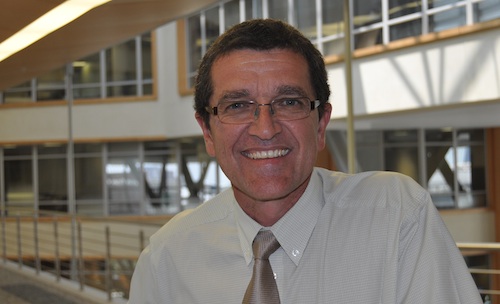
Tower sharing should prove a boon for SA Internet service providers wanting to roll out out their own broadband wireless infrastructure later this year.
That’s the view of Pieter Nel, newly appointed CEO of American Tower Corp (ATC) in SA, which recently purchased the passive (non-radio) components of Cell C’s national base station infrastructure in a US$430m deal.
The country’s larger Internet service providers are expected to participate in an upcoming radio spectrum auction to gain access to spectrum in the 2,6GHz and 3,5GHz bands. In his first media interview since being appointed to ATC, Nel tells TechCentral that service providers will be keen to use the Cell C infrastructure to reduce their capital and operational expenditure.
ATC, which is listed in the US with a market capitalisation of about $22bn, beat off international tower-sharing rivals to win the Cell C deal, which will result in it taking over ownership and management of 1 400 Cell C base stations immediately, and a further 1 800 that are currently being constructed by Cell C as part of the operator’s multibillion-rand network expansion programme.
Cell C has placed no restrictions on what ATC may use the infrastructure for, and the US company is already actively courting operators and service providers to install their radio equipment on the towers.
Nel says ATC’s entry into SA — it already operates in other emerging markets such as Ghana and India — will facilitate more competition in the wireless broadband market. He says it’s a “natural progression” for competition in the wireless market in SA.
“This market will become more competitive because of our presence,” he says. “That’s the way it’s gone in the rest of the developed world. Once you have an independent player that operates on pure market principles it tests the existing agreements between operators.”
As operators begin to build fourth-generation mobile networks in the next few years based on a technology called long-term evolution, Nel expects demand for access to base stations to grow as operators look to expand coverage in new areas and fill gaps in existing coverage.
He says there is a “big opportunity” for ATC to work with Internet service providers wanting to provide their own broadband networks. “We expect a lot of growth to come from that part of the market [and] service providers have already expressed keen interest.”
The Independent Communications Authority of SA is expected to auction off spectrum later this year. The 2,6GHz band is likely to be in strong demand for delivering the next-generation of wireless broadband solutions and could facilitate a significant increase in infrastructure competition.
Nel says ATC has no plans to build a wireless network of its own, but will lease space on the tower infrastructure to companies that can’t or don’t want to build their own towers.
Tower sharing is gaining traction in African countries and other emerging markets as competition begins to bite into their profits. Sharing infrastructure reduces operational costs and capital expenditure and helps operators reduce their carbon footprint by deploying fewer towers.
Nel says ATC will not rely solely on the acquired Cell C tower infrastructure, but will also build its own base stations in areas where it makes sense to do so. The company should begin building new towers this year, but Nel says it’s too early to say how many it will construct.
ATC will also use SA as a base for expansion elsewhere in Africa. “We want between 3 000 and 5 000 towers under management,” he says.
Last year, ATC signed a tower-sharing deal with MTN in Ghana. It’s establishing a joint venture company with MTN called TowerCo Ghana, in which it has a 51% stake. The transaction involves the sale of up to 1 876 of MTN Ghana’s existing sites to TowerCo Ghana for an agreed purchase price of $428,3m. ATC will pay up to $218,5m for its 51% stake in the holding company. — Duncan McLeod, TechCentral
- Subscribe to our free daily newsletter
- Follow us on Twitter or on Facebook




